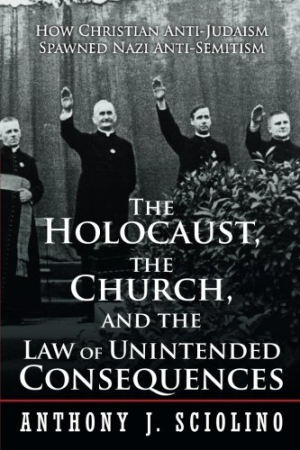The Holocaust, the Church, and the Law of Unintended Consequences
How Christian Anti-Judaism Spawned Nazi Anti-Semitism, a Judge's Verdict
In a haunting yet readable history, Sciolino shows how Christian anti-Semitism contributed to the church’s silent complicity.
Judge and deacon Anthony Sciolino’s debut history is a nuanced and multifaceted exploration of centuries of Christian doctrines concerning Judaism, as well as of the consequences of their cultural embeddedness. The Holocaust, the Church, and the Law of Unintended Consequences poses tough moral questions while also proving to be a haunting, compulsively readable project.
Sciolino began research for his book hoping to discover that the Catholic Church, and Holocaust-era Pope Pius XII, could be exonerated from complicity in one of the worst most staggering attempts at genocide in human history. He discovered, instead, that Christianity’s foundational anti-Judaism enabled widespread silence and inaction from Europe’s religious communities, and that the language of church fathers was even used in systemic campaigns against Jews and other “enemies” of the Third Reich.
In an effort to highlight this connection, Sciolino traces anti-Judaism back to the time of Christ. Proving thoroughly conversant with biblical scholarship and church history, he shows how the politically motivated anti-Judaism in New Testament works and, in the writings of church fathers, became entrenched as theologically valid. In turn, he details historical movements against Jewish communities from the Crusades to the Inquisition, from pogroms based on the myth of blood libel to church campaigns of murder and conversion.
The resultant picture of Christian history is veracious, if not flattering. The author delivers readers to the feet of twentieth-century atrocities with the sense that their deadly, Christian-led anti-Semitism was both indefensible, in light of Christian doctrines of love, and entirely predictable, given Christian teachings regarding Jews.
As chapters move through descriptions of inaction, and even of church alliances with the Nazi state, Sciolino paints a picture of a church torn between duty and tradition. The author gives voice both to critics who name Pius XII’s general inaction as complicity, and to apologists who view the lives he did preserve as proof of an impressive break with anti-Jewish tradition. Sciolino relates his references thoroughly and judiciously. The notion of unintended consequences runs throughout, rendering the church’s complicity not always malicious or intentional.
Sciolino’s balancing act is unwieldy yet credible. The worst offenders among Christian clergy are named, including two priests executed for war crimes, and their sins are unflinchingly detailed; but also named are the many Christians honored for saving Jews. Sciolino lists Pius XII’s failings, but also his historically unprecedented moves to save some Jewish lives, affording even his inaction a level of depth. There are few easy villains in this work.
While meditations on church history don’t always yield immediate rewards, Sciolino’s book does prove a good primer on interactions between church and state, down through modernity. Reflections on the postwar censuring of liberal theologians prove particularly interesting, and invite reflection on how the church might stumble in the future.
Both an indictment for past misdeeds and a call to a more responsible future, The Holocaust, the Church, and the Law of Unintended Consequences is poised to add new depth to discussions of Christianity’s involvement in widespread anti-Jewish sentiment and action.
Reviewed by
Michelle Anne Schingler
Disclosure: This article is not an endorsement, but a review. The publisher of this book provided free copies of the book and paid a small fee to have their book reviewed by a professional reviewer. Foreword Reviews and Clarion Reviews make no guarantee that the publisher will receive a positive review. Foreword Magazine, Inc. is disclosing this in accordance with the Federal Trade Commission’s 16 CFR, Part 255.

